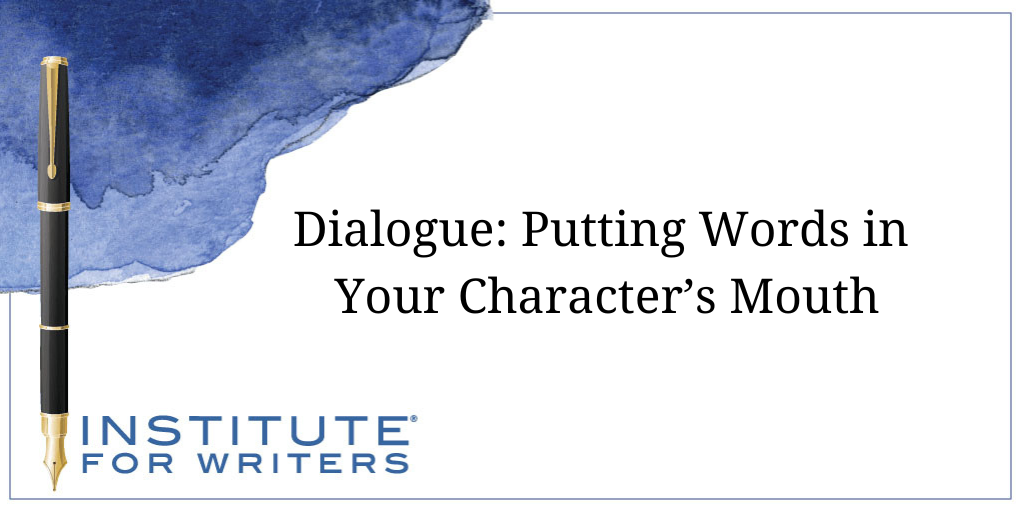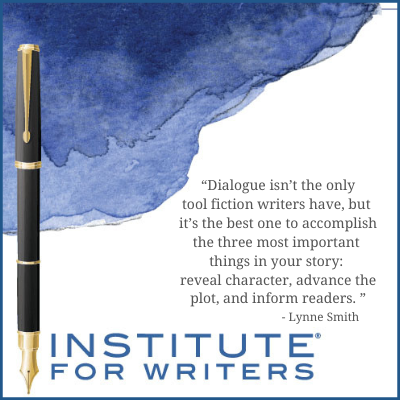
Why Submitting to Contests is a Win-Win
Should you enter a writing contest or not? If your writing rises to the top, you just might win a prize upwards of thousands of dollars if you’re lucky.

The best way to learn how to write dialogue is to read plays. Except for stage directions a play is all dialogue—nothing else.
The spoken word is the only tool a playwright has to tell his story. Props and costumes give audiences an idea of where and when the play is set—think Shakespeare or Euripides—but the story unfolds, develops, and reaches its climax in what the characters say to each other.
Dialogue isn’t the only tool fiction writers have, but it’s the best one to accomplish the three most important things in your story: reveal character, advance the plot, and inform readers.
Action is the best way to breathe life into your characters. Dialogue is the spark for that, and it’s the best way to delineate, or reveal character. What characters say, how they say it, and what they say to each other shows personality, temperament, and general outlook on life. Word choices and sentence structure help with that.

I try to give each of my characters their own vocabulary. Everyone has favorite go-to words, even people I’ve made up. I listen for those when my characters talk. It’s also fun to come up with catchphrases that readers will recognize so I can skip dialogue tags now and then. The best way to vary speech patterns and keep your characters from sounding alike is to vary your sentences by length and type.
Speech patterns are subject to change depending on the scene and the other characters present. Characters at a party laugh and chat and tell jokes. But a character being interviewed by the police in a murder investigation will be tense and anxious and guarded.
You should have some idea what your characters need to talk about in your story and when—this is how they help you advance the plot. Use your outline or synopsis to map where such conversations need to occur and the information they should contain. In a mystery, characters discuss the clues they’ve uncovered. In a romance, feelings are paramount.
A plot conversation shouldn’t take place during a car chase. Readers won’t remember the dialogue—they’ll remember the chase. A rest and regroup scene following action is good placement. Dialogue about plot should contain new information and recap events so readers can keep up.
Informing readers through dialogue sounds simple, but it isn’t. The trick is weaving in stuff readers need to know—that doesn’t deal with the plot—without making it obvious. Easy to say, not easy to do. Then why bother? Because readers remember dialogue better than they remember anything else.
Use it to introduce new characters, provide back story, and discuss upcoming events that will impact the story and your characters. Anything and everything you want readers to remember—all in a casual, we’re-just-having-a-cup-of-coffee-and-talking-here conversation.

So don’t alert readers to hear about the weather. It isn’t important unless there’s a tornado on the ground drawing a bead on your characters. Or a hurricane about to make landfall. If you want readers to know it’s hot, cold, raining, or snowing, inform them in the narrative.
Avoid one-word statements, questions, or responses. You might need the words later. Plus, one-word responses can appear lazy to an editor.
Especially if you load the page with them. Every paragraph indent breaks the reader’s eye contact with the page. Too many create eye strain and mental fatigue. Keep readers riveted to the dialogue and immersed in the story.
I won’t let my characters speak unless they say at least five words. Those five words often give me ideas for adding a few more that reveal character, advance the plot, or inform readers.
For dialogue tags stick with said or asked. Occasionally replied, retorted, answered, or argued. Rarely bit back, shot back, screamed, or shouted, but not much else. Show the emotion your characters are feeling in the words they speak. Don’t tell it in a dialogue tag like “he said angrily.”
Characters speak individually, not as a Greek chorus. No exceptions. Ever. If you have a scene with a lot of characters and you feel you need to include a group response, do it in narrative with something like: “The crowd cheered.” or “The rest of the kids grumbled and groused.”
Here’s what Mark Twain says about writing dialogue:
“When the personages of a tale deal in conversation, the talk shall sound like human talk, and be talk such as human beings would be likely to talk in the given circumstances, and have a discoverable meaning, also a discoverable purpose, and a show of relevancy, and remain in the neighborhood of the subject in hand, and be interesting to the reader, and help out the tale, and stop when the people cannot think of anything more to say.”
The most important words in your story are the ones you put in your character’s mouth.

Should you enter a writing contest or not? If your writing rises to the top, you just might win a prize upwards of thousands of dollars if you’re lucky.

To many, writing is revision, and most writers revise their manuscripts numerous times before they’ve shaped it into the best version that it can be.

We’re going to look at influential female authors of the past, those impacting the present, and whom the industry expects to make a big splash.
1000 N. West Street #1200, Wilmington, DE 19801
© 2024 Direct Learning Systems, Inc. All rights reserved.

1000 N. West Street #1200, Wilmington, DE 19801
© 2025 Direct Learning Systems, Inc. All rights reserved.

1000 N. West Street #1200, Wilmington, DE 19801
©2025 Direct Learning Systems, Inc. All rights reserved. Privacy Policy.
12 Comments